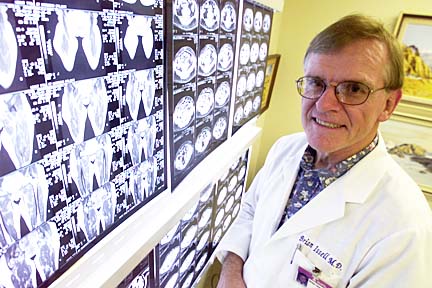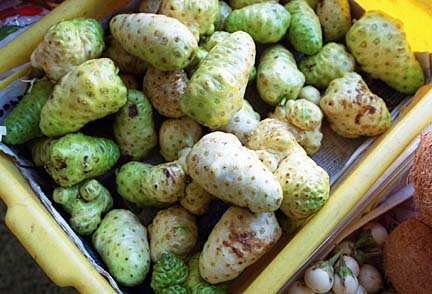


The noni plant, used in traditional healing throughout Polynesia, has become one of the most popular complementary treatments worldwide for all kinds of diseases.
Research will begin to test
the plant against cancer
and its symptomsBy Helen Altonn
haltonn@starbulletin.comYet, there is no evidence that the plant is useful medically, says Dr. Brian Issell, clinical sciences program director at the Cancer Research Center of Hawaii.
He has received a National Institutes of Health grant of $170,000 per year for two years to conduct the first scientific study of noni in humans.
Noni, extracted from the Indian mulberry plant, has been used for more than 1,000 years in traditional healing practices of native Hawaiians and other Pacific Islanders and Asian populations.
However, it's the least known of the five most commonly used complementary medicines, says Nina Etkin, medical anthropologist who heads the University of Hawaii anthropology department.
The others -- aloe, garlic, ginseng and lemongrass -- are very well characterized chemically and their medical uses are well-documented, she said.
Etkin looked at the plants as part of a study on use of complementary medicines in Hawaii published in 1999 in "Economic Botany."
She said she became interested when noni emerged as "a prominent phenomenon" here in the early 1990s. "At one point it was very expensive. People were using noni for virtually everything -- cancers, diabetes, cardiovascular disease, colds, infections and wounds."
Noni was used sparingly in traditional Hawaiian medicine, and only topically on wounds and skin disorders, never internally, she said. So, she was curious about the plant's dramatic reputation for medical treatments.
She found that, driven by commercial ventures and advertising, "it really took fire and now is very popular worldwide," she said. "But, as many of these complementary and alternative medicines, it was virtually untested. Its reputation preceded demonstrated scientific merit."
Issell said he was prompted to look at noni because many people say it is helping them. Some studies have shown it has some effect on cancer cells, but it hasn't been studied scientifically in people, he said.

"We want to see if it works or not, and how good the compounds are," he said. "We want to make sure it helps people more than harms them."He plans to begin research early next month after the noni capsules arrive. A mainland company is producing them with freeze-dried extract from Hawaii-grown plants, he said.
Cancer patients for whom standard treatments haven't worked, or who haven't had any treatments, and meet other criteria will be recruited to take the capsules.
The first phase is to figure out what doses can be tolerated and if there is any evidence that noni alleviates a patient's cancer symptoms or causes the cancer to shrink, he said.
Patients will be evaluated regularly, with measurements of the tumors and other things associated with cancer, such as fatigue, depression and general quality of life, he said.
The next stage will be to look at particular cancers and identify any ingredients in noni that are more powerful as anti-cancer agents, he said.A traditional way of preparing noni in Hawaii is to seal the fruit in a glass jar with water and leave it in the sun to ferment, making juice to drink.
Issell said: "The smell is worse than the taste. When you taste it, it's not as bad as you think it would be. It's a little sour, a little bitterness to it."
Putting it in capsules is not so much to hide the taste but to be consistent, he said.
He said he's excited because his noni research is "just the very first step at looking at a number of botanicals, plant extracts, that have been used in traditional healings of our multicultural population here."
Issell has been involved in developing other anti-cancer drugs from plants, such as those from the periwinkle plant. "Two very powerful drugs actually cured patients with otherwise incurable cancer," he said.
For more information about the noni study, call the clinical trials unit at 586-2979. For information about complementary and alternative treatments for cancer, call the Cancer Information Service, 1-800-4-CANCER.